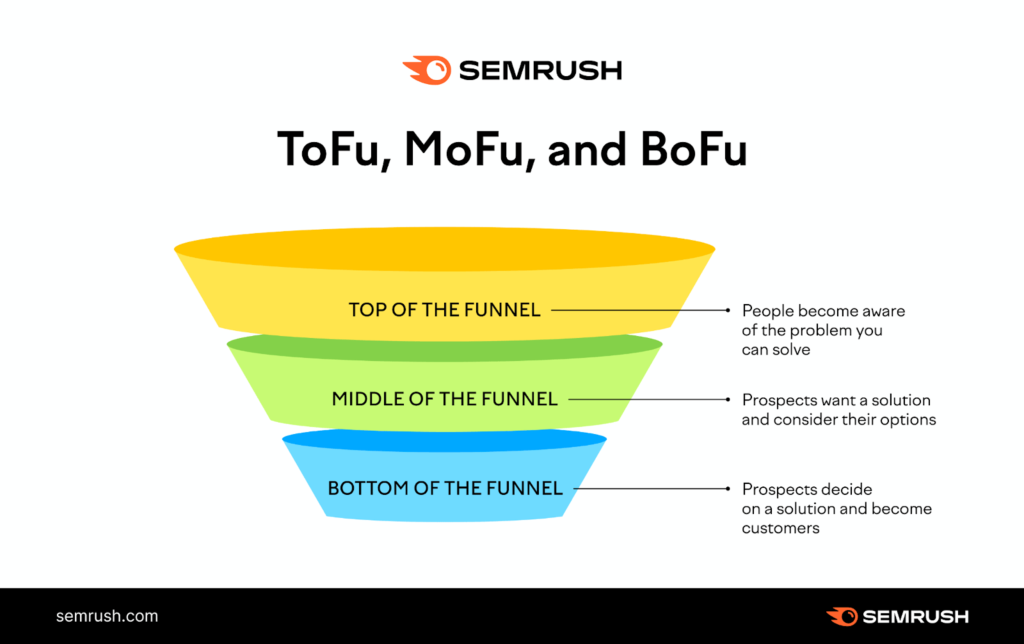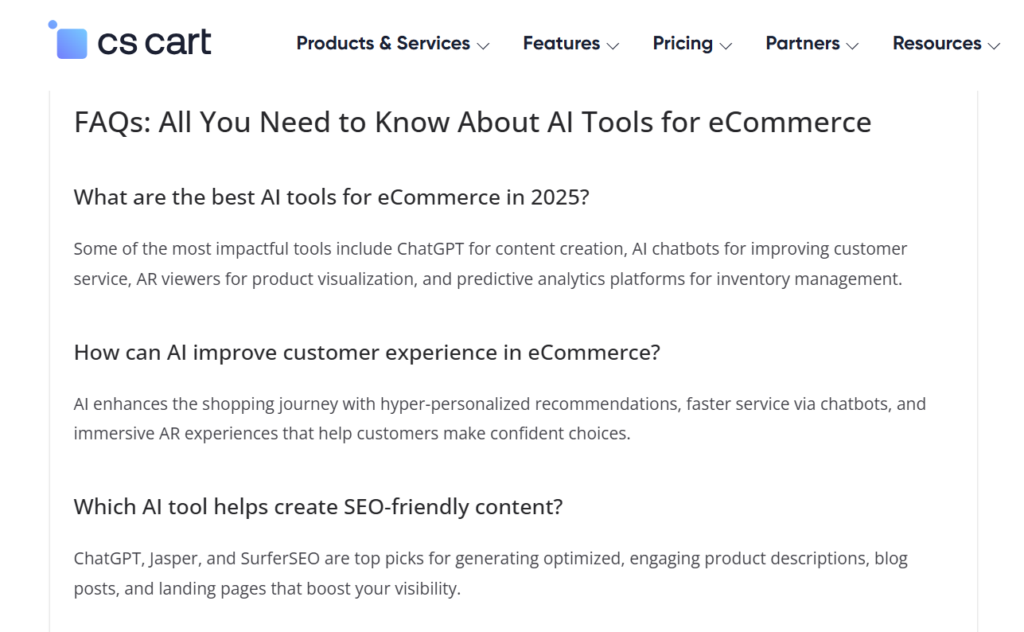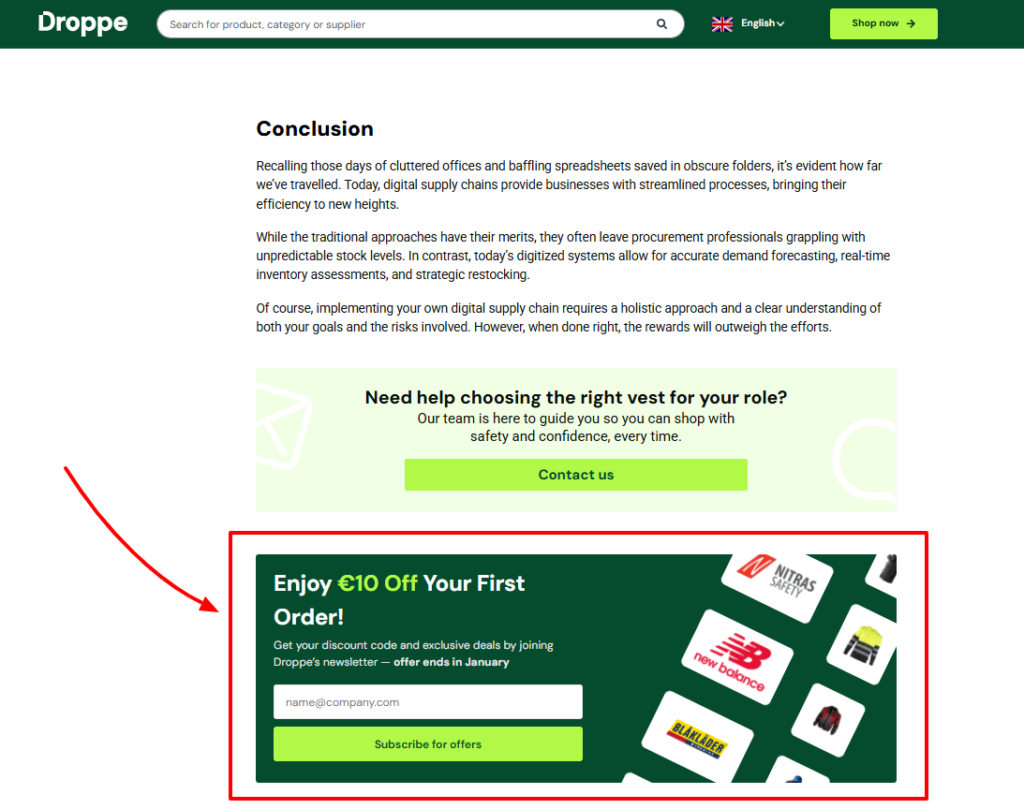
Without content, your ecommerce brand is invisible.
Unless you also have a physical store that hands out brochures and sends direct mailers, there’s no way for people to know your online store exists. (I mean, unless you start one of those network marketing chains? But I digress …)
In 2026, content marketing is non-negotiable for ambitious ecommerce brands.
In this guide, you’ll learn how content marketing for ecommerce helps your brand grow, and six content marketing strategies you should try in 2026.
To be visible and attract shoppers to your online store, you need a content marketing strategy.
According to the Content Marketing Institute, 83% of marketers say content marketing is their most effective channel for generating demand, which highlights how closely visibility and growth are tied to strong content foundations.

Even if you lean heavily on ads, the ads still need content to point to. (E.g., product pages, landing pages, blog posts, or videos.) Without well-optimized content on those pages, ads will underperform because:
You might get clicks, but those visitors won’t convert if they land on bare or poorly optimized pages.
Plus, without content, search engines can’t understand or rank your website.
Search engines rely on content to understand:
Without content, there’s nothing for Google, Bing, or AI systems to crawl or index, so your site won’t appear in search results.
TL;DR: Content gives your audience the information they need, showcases your expertise, and guides them from curiosity to purchase. It’s the foundation that makes every marketing effort (paid or organic) more effective and scalable.
Before I cover the strategies below, I want to stress how important it is to have a solid SEO keyword strategy FIRST.
If you try to implement the strategies below without keyword research, you won’t know which specific topics to target in your content.
You need to know: What your audience is searching for when they’re at the top-of-the-funnel, middle-of-the-funnel, and bottom-of-the-funnel. (This includes their social media searches, Google searches, and AI SEO searches.)

Work with an SEO strategist or content agency to get these topics for your e-commerce website. Have them map out a visual plan your content team can easily follow.
Here’s a quick template to give you an idea of what that could look like.
Ecommerce SEO content strategy template
Top of funnel (TOFU – awareness)
Content type: Blog, video, social post
Primary keywords will focus on: Informational, problem-based keywords
Goal: Traffic, visibility
Exact TOFU topics/primary keywords to target:
Middle of funnel (MOFU – consideration)
Content type: Guide, email, comparison blog, podcast
Primary keywords will focus on: Solution-based, comparison keywords
Goal: Leads, engagement
Exact MOFU topics/primary keywords to target:
Bottom of funnel (BOFU – conversion)
Content type: Product page, case study, email, video
Primary keywords will focus on: Purchase-intent, brand + product keywords
Goal: Sales, retention
Exact BOFU topics/primary keywords to target:
If you don’t have a content team, your SEO agency can support you with content assets and a publishing content calendar.
Make sure to have them conduct a technical SEO audit, too. This is especially important if you used a dropshipping website builder because it might not be SEO-optimized out of the box. (If your technical SEO isn’t solid, your audience may never see the content you publish!)
GoDaddy, Weebly, and Ecwid offer basic SEO tools, so if you used these when building your ecommerce site, you’ll need some extra technical SEO support.
BigCommerce and Shopify, on the other hand, are highly SEO-optimized out-of-the-box.
Still, you can’t go wrong with an audit, just in case.
You also need your SEO team to optimize every product page to capture shoppers who are ready to buy.
Product SEO focuses on transactional, product-specific keywords, such as “buy blue running shoes,” rather than broad topics. This helps your items appear in search results for customers actively looking to purchase.
Trying to do this on your own is exhausting, btw. (Especially if you have a big site.) Here are some enterprise SEO agencies that can help.

K, off to those strategies!
Start a blog that targets your buyer personas and addresses customer pain points.
Use the topics your content marketing agency planned for you in your blog post titles. And make sure to publish them on the right pages. (See the pillar pages and subpages example below.)

Weave in semantic keywords for each primary keyword when writing blog posts. (You can pull these with an SEO tool like Frase.)
Interlink your pillar pages and subpages where appropriate to create “topic clusters” — these are great at showing Google which topics your brand specializes in. The more strategic your clusters are, the more your authority and rankings can grow.
For example, your “curtains” blog posts should interlink with your “blue bedroom curtains,” “linen curtains,” and “blackout curtains” blog posts.
Make sure each of your blog posts is thoughtful and helpful.
To encourage AI to cite your blog posts, prioritize well-structured formatting. For example, include a highlights section under your blog introductions, use proper H2s and H3s to separate your body sections, and include an FAQ section after your conclusions.
For the FAQ sections, optimize them around the primary keyword for that post. Here’s an example from CS-Cart on ecommerce AI tools.

Track your blog post performance over time and continue to refresh older posts with new, up-to-date content. You can also repurpose snippets from your best pieces across social media and other channels.
Create content that supports the way different people search, learn, and shop.
For example:
Video content is especially important in ecommerce. (Since shoppers aren’t inside a physical store where they can see or try your products in person). Product demos, walk-throughs, unboxings, and “best of” videos are great options here.
To get the most value from video marketing, upload your videos to YouTube and then repurpose them across your other marketing channels. Distribute different cuts and versions across social media, ads, and email marketing.
Make sure to embed relevant videos in your blog posts and on your product pages. (Sometimes, you can also embed purchase options directly into video content.)
Your website homepage is also a perfect spot for videos. New visitors who are trying to learn more about your brand will instantly know what you’re about and what you sell after watching a quick video.
Here’s an example from Magneto IT Solutions about B2B e-commerce solutions. 👇

Adding video content also helps you optimize your website pages for Google featured snippets and AI citations.
(And bonus: Sometimes videos rank much faster and easier than written content. Even for high competition keywords.)
Get your products in front of new audiences while other people create the content.
Shoppers often search for gift guides, “best of” lists, or product round-ups when they’re serious about buying. Here’s an example from The New York Times’ Wirecutter publication about the best noise-cancelling headphones:

Having your products featured in these assets puts your brand in front of audiences with high intent. Even one product feature in the right round-up can bring in continuous leads and sales.
For this strategy, start by finding blogs, influencers, and review sites that match your niche. Offer incentives like a commission rate, flat payment, or free products to encourage placements. (Make sure to only work with trusted affiliates to protect your brand’s reputation.)
Start commenting on relevant Reddit posts to boost your SEO.
Reddit content ranks in Google search results and is also one of AI SEO’s sources. (Meaning ChatGPT and Perplexity could cite your brand if it’s mentioned in Reddit threads.)
Jeremy Moser from uSERP has a hot take about this. In a LinkedIn post about LLM citations, he mentions:
“We consistently see AI systems surface Reddit discussions more often than company content — especially in buyer-focused queries. The reality: Most companies are still optimizing meta tags while AI systems are reading Reddit threads to form opinions about brands.”
What’s wild is that even older posts from three to five years ago are ranking and getting cited. So you’re not limited to commenting on recent posts.
Check out this thread that pulled up when I searched “best vegan foundation” on Google:

Here’s the Google search proof.

(Image provided by Ioana)
What’s also really interesting is that ChatGPT and Perplexity may summarize patterns that originally appeared in Reddit threads, without showing a Reddit link. So even if it doesn’t provide a link to the exact Reddit post, it may still mention your brand in the citation.
Reddit marketing can also help you scale your user-generated content over time.
If someone asks about the best vegan foundation and you reply with helpful tips or experiences, your comment can get upvoted, shared, and pushed higher up in search results.
I recommend having your marketing employees help you with commenting. (Maybe choose three to five designated “Reddit marketers.”) Have them use their personal Reddit accounts and stress how important it is to be helpful — not promotional. Otherwise, Reddit moderators WILL block them. Don’t ask me how I know … 😑
Use email marketing to drive sales, build loyalty, and keep customers coming back.
For ecommerce brands, email is liquid gold. You can reach buyers directly with personalized content, timely offers, and helpful information.
Start by getting a trusted email tool for ecommerce marketing.
Klaviyo is one of the best.
Next, use your email software to create different lead magnets to help grow your list. (Like a banner promoting 10% off their first order if they sign up for your email newsletter.) Add relevant lead magnets at the top and bottom of your home page, blog posts, and product pages.
Here’s a blog post about digital supply chains that has a coupon lead magnet at the end of the article.

Follow up with post-purchase content and a segmented email series that matches your customers’ interests. Klaviyo and ActiveCampaign both offer detailed segmentation features and analysis.
Personalized campaigns (like birthday discounts, loyalty rewards, and tailored product recommendations) increase engagement and repeat purchases.
Coupons work exceptionally well, too.
According to Salsify and the Digital Shelf Institute’s (DSI’s) Ecommerce Pulse Report, 62% of consumers say flash sales and other limited-time discounts are their top motivation for completing online purchases.
Here are the top coupon types that get the best sales according to the report.

Email marketing also helps with customer retention. Share product tips, usage guides, and care instructions to give your customers even more value.
*Pro-Tip: A/B test your campaigns to see what resonates best. Send out and repurpose your winning versions for more sales.
Spread the word about your products on social media.
Focus on platforms where your audience hangs out, and create content that fits their habits and interests.
For example:
Work with nano- and micro-influencers. Their audiences trust their opinions, so even small-scale partnerships can attract sales and authentic engagement.
Run photo challenges, giveaways, and limited-time offers to encourage participation and sharing. These campaigns can help increase visibility, attract new followers, and create excitement around your brand.
Ask customers to share photos or videos using your products with a branded hashtag to build social proof. Repurpose these across your posts, ads, emails, and product pages.
Bonus Tip: Add UGC content to your sales pages to prevent abandoned check-outs.
Post short-form videos, carousel posts, tutorials, and behind-the-scenes stories to give your audience multiple ways to engage.
Use social media for:
Every post should either educate, build trust, or drive action.
And there you have it! A solid content marketing for ecommerce guide you can start implementing today.
Which of these strategies will you try first? I recommend SEO and blogging. They’ll help you set the foundation you need for the rest of your marketing channels.
PS: If you need a way to publish blog posts from Google Docs to WordPress, fast, you’ll love Wordable. Try Wordable Now.